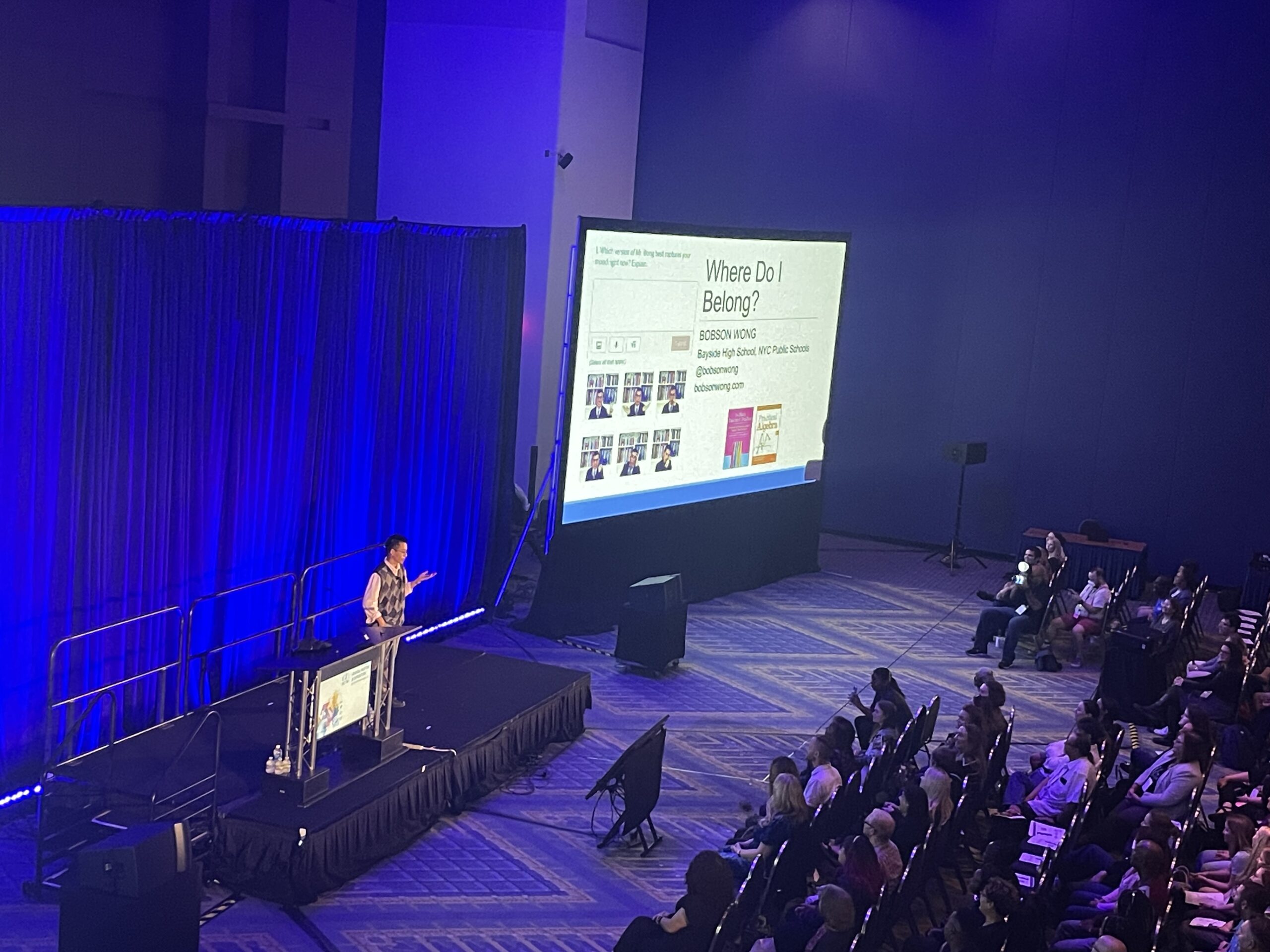At the NCTM Annual Meeting in Washington, DC last week, I shared my story about how my identity has shaped the way that I teach math. I spoke at the Ignite! session on Friday night. (Ignite! talks are five-minute talks in which slides automatically advance every 15 seconds). I was deeply honored to be part of an amazing lineup: Dr. Zandra de Araujo, Dr. India White, Dr. Amanda Jensen, Dr. Skip Fennell, Luke Wilcox, Dwaina Sookhoo, and Christina Lincoln-Moore.
A video of my talk is here: https://bit.ly/bw23ignite. I did the closed captioning myself!
Here is a transcript of my talk, edited slightly for clarity:
So let me tell you a little bit about myself. I’m a second-generation Chinese American, so my parents emigrated to this country from China. I grew up in New York City, in an ethnically diverse neighborhood of Queens. My parents spoke to me primarily in Cantonese, but because I grew up in America, my first language was English, and so Cantonese was kind of a mysterious oral language to me.
I did very well in school. I went to what we call a specialized high school in New York City, did very well in math and writing. Senior year of high school, I was editor-in-chief of the Math Bulletin. I was editor-in-chief of the literary magazine. One of my most memorable teachers was Dr. Nash. She was my AP US History teacher. She taught me that history is – is not just a bunch of facts. It’s a story that you construct by stating your assumptions, by organizing evidence, and drawing conclusions. And so, by the time I graduated from high school, I wasn’t sure if I wanted to major in math or history. When I went to college, I decided to take a lot of math classes and a lot of history classes.
But at Princeton, the math classes were really intimidating. The professor would go up to the board, and he would just start talking, and start writing on the board, and then he would slide the board up and then there was another board underneath that, and he would keep on writing, and keep on writing, and I would be copying it down, and I would have no idea what I was writing.
So I majored in history. And I actually got a master’s degree in history, and I did a lot of these unusual and interesting jobs after graduate school, but I never really felt like I fit in.
Eventually I decided to become a teacher. So when I applied to this certification program, they asked me what I wanted to teach. So I said, “OK, took a lot of math classes, majored in history. I could teach math or social studies.” And they gave me math. That’s how I became a math teacher. Yeah, really! Because, as I was telling my colleagues about, they’re all math majors, and I was a history major, and they were like, “Really?”
But one thing about my background that helped me was that I was able to see that my students, a lot of my students struggled with math, because all these symbols and all these words made math like a different language for them. Now, I had experience struggling with language, because college math for me was a totally different language, and the Cantonese that my parents spoke to me as a child was foreign to me until I found all these resources when I was an adult that helped me to understand Cantonese.
So I started teaching math as a language, emphasizing how to write and pronounce math symbols, implementing protocols and strategies to help students communicate more effectively. But I found that just implementing these strategies wasn’t enough.
It was also important to see students as individuals who should be valued for who they are.
So I want to acknowledge three individuals who helped me understand this.
- Robert Berry, past president of NCTM. He saw my background as an asset, not as a liability, and he invited me into the math ed community.
- Cathery Yeh, she is my role model for building and nurturing communities. She connected me with other Asian American educators and she made me feel welcome.
- Dr. Brandie Waid – she is a queer Latinx scholar. She reminded me that the math ed community needs to ensure that everyone, especially those who have been historically marginalized, need to feel safe and welcome in the math community.
These people have shown me that implementing strategies isn’t as important as building relationships. You know, making students stand is great, but it’s not important as learning how to stand with them.
And so, this feeling of safety and community empowered me to take risks. I became more active in the math ed community. I even won an award for being influential in math education. And this feeling of support – this was the boost that I needed.
Our classrooms need to be communities where all students feel safe and welcome. NCTM needs to be a community where all math educators feel safe and welcome.
And as I stand here tonight, in front of all of you, the question that I asked at the beginning is “Where do I belong?” I belong here, with you. Thank you.

Thank you for teaching, support, and building relationships with your students; thank you for sharing your motivational story!